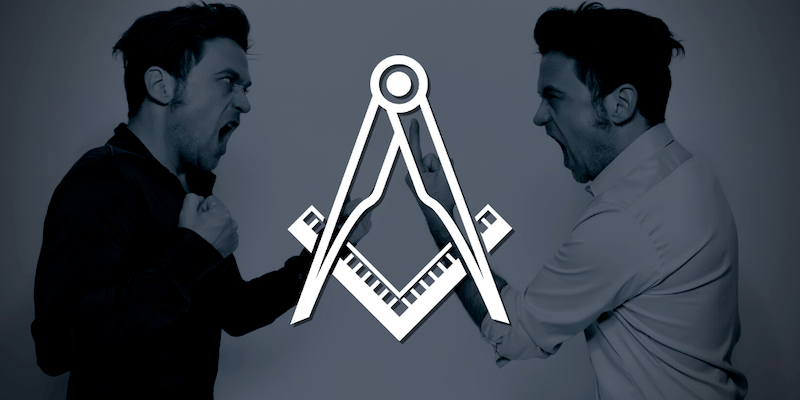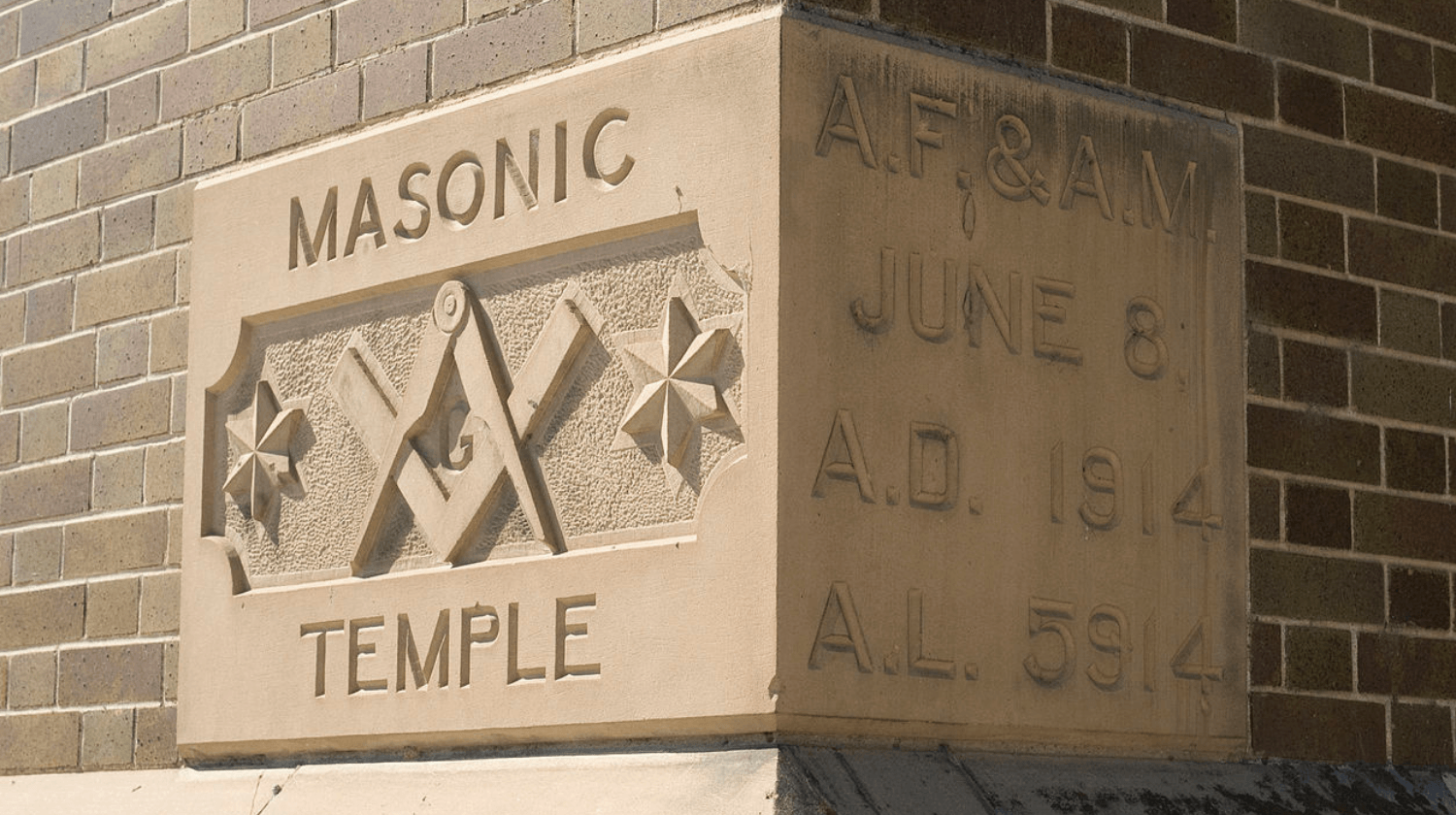Dealing with people who disagree with your beliefs can be challenging, especially when it comes to Freemasonry.
As a Freemason, you may encounter individuals who hold misconceptions or negative views about the organization, and thus; it is essential to understand how to handle these situations with grace and respect (while upholding the values of Freemasonry).
Engaging with critics can be a daunting task (rarely anyone will admit they were wrong) but you can also see this as an opportunity to educate and enlighten others, and in this article, I’m going to show you how to do just that.

Key Takeaways (TLDR)
- Understanding the history, principles, and values of Freemasonry is crucial in responding confidently and accurately to any questions or criticisms that may arise.
- Engaging in constructive dialogue with critics can help to dispel myths and misconceptions surrounding Freemasonry.
- By upholding the values of Freemasonry and responding with grace and respect, you can help others to understand and appreciate the positive impact of the organization.
Dealing With Common Misconceptions
Despite the fact that Freemasonry has been around for hundreds of years, there are still many misconceptions about the organization.
Some people believe that Freemasonry is a secret society that engages in nefarious activities. This, as you know, couldn’t be further from the truth.
Freemasonry is not a secret society. It’s a society with secrets.
This means that while there are certain things that are kept private within the organization, there is nothing sinister or harmful about them.
n fact, many of the secrets are simply the methods used to teach moral lessons and encourage personal growth.
Another common misconception is that Freemasonry is a religion.
This is also false, and you can explain to your critics how while members are expected to believe in a higher power, the organization is not affiliated with any particular religion.
Members of all faiths are welcome, and religion and also politics are not discussed or debated within the organization.
By understanding the history and principles of Freemasonry, as well as common misconceptions, you’ll be better equipped to deal with people who disagree with the organization.
Remember to stay confident, knowledgeable, and neutral in your interactions, and always be willing to answer questions and address concerns.
How to Engage With Critics

It’s important to engage with these critics in a respectful and productive manner.
Here are some strategies for engaging with critics:
Active Listening
Active listening is an important skill for engaging with critics.
When someone expresses criticism or disagreement, listen carefully to what they have to say.
Try to understand their perspective and their reasons for disagreeing with Freemasonry.
Ask questions to clarify their position and show that you are genuinely interested in their point of view.
Respectful Dialogue
When engaging with critics, it’s important to maintain a respectful dialogue.
Avoid getting defensive or confrontational.
Instead, focus on finding common ground and exploring areas of agreement.
Be open to learning from the other person and be willing to consider their perspective.
Setting Boundaries
While it’s important to engage with critics, it’s also important to set boundaries.
If someone is being disrespectful or hostile, it’s okay to end the conversation and disengage.
You don’t have to tolerate abuse or harassment. It’s also important to remember that you don’t have to convince everyone to agree with you.
Focus on having productive conversations with people who are open to dialogue and willing to engage in respectful debate.
By practicing active listening, engaging in respectful dialogue, and setting boundaries when necessary, you can effectively deal with people who disagree with Freemasonry in real life (or online).
Remember to approach these conversations with confidence and knowledge, and always strive to maintain a neutral and clear tone.
Conflict-Resolution Skills
Conflict is inevitable in any relationship, but it is how you handle it that determines the outcome.
When dealing with individuals who disagree with Freemasonry, it is important to use conflict resolution skills to find a mutually beneficial solution.
It is important to communicate openly and honestly throughout the conflict resolution process. Avoid personal attacks or insults, and focus on finding a solution that respects both parties’ beliefs and values.
By using conflict resolution skills, you can turn a potentially negative situation into a positive one.
This can help build stronger relationships and promote understanding and respect for Freemasonry.
Community Involvement
As a Freemason, it’s important to be an active member of your community and to participate in public events.
This can help to dispel any misconceptions or negative attitudes that people may have towards Freemasonry.
Public Education
One way to get involved in your community is to participate in public education events.
This can include giving talks or presentations about Freemasonry at schools, community centers, or other public venues.
You can share information about the history and values of Freemasonry, as well as address any common misconceptions or concerns that people may have.
Charitable Activities
Another way to get involved in your community is to participate in charitable activities.
Freemasonry has a long tradition of supporting charitable causes, and there are many ways that you can get involved.
This can include volunteering at local food banks or homeless shelters, organizing fundraising events for charities, or participating in community service projects.
By getting involved in your community, you can help to build positive relationships with those around you and show them the positive impact that Freemasonry can have on society.
Frequently Asked Questions

What are effective ways to engage in civil discourse with individuals opposed to Freemasonry?
When engaging in civil discourse with individuals who oppose Freemasonry, it is important to remain calm and respectful. Listen to their concerns and provide factual information about the organization. Avoid getting defensive or confrontational, and instead focus on finding common ground and promoting understanding.
How can Freemasons demonstrate the positive impact of their organization to skeptics?
Freemasons can demonstrate the positive impact of their organization by highlighting their charitable work and community involvement. Emphasize the values of brotherhood, charity, and truth that are central to Freemasonry, and provide examples of how these values are put into action. Encourage skeptics to visit a lodge and see for themselves the positive impact Freemasonry has on its members and the community.
What strategies can Freemasons use to maintain composure when faced with criticism?
Freemasons can maintain composure when faced with criticism by staying focused on their values and the positive impact of the organization. Respond calmly and respectfully to criticism, and avoid getting defensive or confrontational. Remember that not everyone will agree with or understand Freemasonry, and that is okay.
In what ways can Freemasons educate people about the misconceptions of Freemasonry?
Freemasons can educate people about the misconceptions of the organization by providing factual information about its history, values, and practices. Address common misconceptions, such as the belief that Freemasonry is a secret society or that it has a hidden agenda. Encourage open dialogue and answer questions honestly and respectfully.
How should Freemasons approach discussions about their fraternity with family or friends who disapprove?
When discussing Freemasonry with family or friends who disapprove, it is important to remain respectful and understanding of their concerns. Listen to their perspective and provide factual information about the organization. Avoid getting defensive or confrontational, and instead focus on finding common ground and promoting understanding.
What are the key points Freemasons can highlight about the fraternity’s values to alleviate concerns?
Freemasons can highlight the values of brotherhood, charity, and truth that are central to the organization to alleviate concerns. Emphasize the positive impact of these values on members and the community, and provide examples of how they are put into action. Encourage open dialogue and answer questions honestly and respectfully.